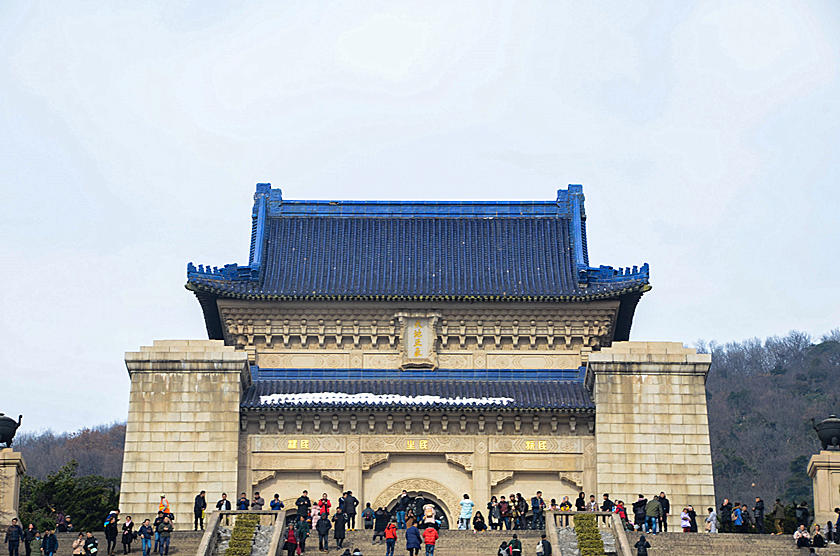Chinese Name: 中山陵 Pronunciation: zhōng shān líng
Building Time: 1926
Best Visiting Season: All seasons
Suggested Visiting Hours: 1-2 Hours
Address: Southern foot of Purple Mountain, Xuanwu District, Nanjing
Mausoleum Area: More than 80,000 square meters(about 20 acres)
|
Attractions
|
Price |
| Mausoleum ( the Stele Pavilion, the Sacrificial Hall, the Burial Room etc) |
Free |
| The Musical Stage | 10 yuan |
| Meiling Palace | 30 yuan |
| Joint Ticket ( including the admission fee for the Musical Stage, Meiling Palace, Ming Tomb and Linggu Temple) |
100 yuan |
|
Attractions
|
Time | |||
| Core areas( including “Tianxia Weigong” Tomb Gate, Stele Pavilion, the Sacrificial Hall) | 8:30am-17:00pm (closed on Monday for maintenance, except for legal holidays, the anniversary of both birthday and death day of Mr. Sun Yat-sen, which are on Nov. 12 and Mar. 12 respectively. ) |
|||
| The Burial Room | The tomb is open from Tuesday to Friday (except for legal holidays), and the birthday and death anniversary of Dr. Sun Yat-sen | |||
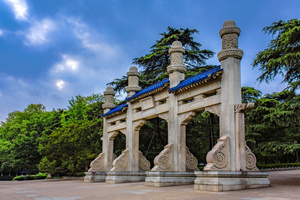
Mr. Sun Yat-sen is a great national hero and great patriot, who was born on 12 November 1866, and died on 23 April 1929. As a pioneer of China's democratic revolution, Dr. Sun, considered as the “ Father of Modern China”, put forward the famous Three People’s Principles (Nationalism, Democracy, the People’s Livelihood) and founded the Republic of China after the 1911 revolution which ended the monarchy of the imperial Qing government.
Located at the southern foot of Purple Mountain in Nanjing, Sun Yat-sen Mausoleum is the mausoleum of Dr. Sun Yat-sen, the great pioneer of the democratic revolution in modern China, which is considered as a masterpiece among all buildings of the former Republic of China. The mausoleum covers an area of more than 80,000 square meters, which was started to construct in the spring of 1926 and completed in the summer of 1929.
Facing Pingchuan in front, Qingzhang in the back, Linggu Temple in the east and Ming Tomb in the west, the whole building complex of Sun Yat-sen Mausoleum is built against the mountain, and gradually rises along the central axis from south to north. The main buildings include Bo 'ai Square, tomb roads, tomb gates, stone steps, tablet pavilions, sacrificial halls and burial rooms, etc., which are arranged on a central axis, reflecting the style of Chinese traditional architecture. The architecture of Sun Yat-sen Mausoleum combines the essence of ancient Chinese and western architecture, which is solemn and simple.
In 1961, Sun Yat-sen Mausoleum was announced by the State Council as the first batch of national key cultural relics protection units; In 1982, it was listed as a national key scenic spot; In 1991, it was listed as one of the top 40 tourist attractions in China by the National Tourism Administration; In 2007, it was listed as the first batch of national 5A-level tourist attractions; In 2016, it was selected into the first list of "Chinese Architectural Heritages in the 20th Century".
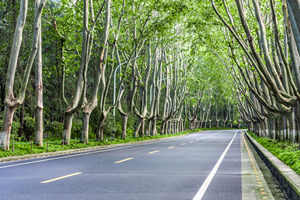
As early as the first year of the Republic of China (1912), when Sun Yat-sen took office as interim president in Nanjing, he visited the Purple Mountain several times. On March 10, 1912, after Sun Yat-sen resigned as interim president, he went hunting in Purple Mountain and saw that the scenery was very majestic and told his fellows that he wanted to be buried here after he passed away.
In January 1926, construction of the mausoleum started.
On June 1, 1929, the National Government held the Feng 'an Grand Ceremony, and moved Sun Yat-sen's remains to Zhongshan Mountain, Nanjing.
In 1931, the mausoleum was completed, covering an area of more than 80,000 square meters.
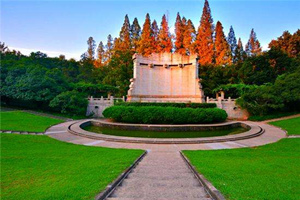
As a building affiliated to the complex of Sun Yat-sen Mausoleum, Sun Yat-sen Mausoleum Music stage is an open-air stage for ceremonies, music performances and assembly speeches, which is mainly used to commemorate Dr. Sun Yat-sen. The stage covers an area of nearly 250 square meters, and there is a large arc-shaped wall behind the stage, with a height of 11.3 meters and a width of 16.7 meters, which has the function of collecting sound. The architectural style of the music stage is a combination of Chinese and Western elements, which fully absorbs the architectural features of ancient Greece in terms of natural environment, plane layout and facade modeling, while the details of buildings such as music stage are treated in the form of Chinese Jiangnan classical gardens.
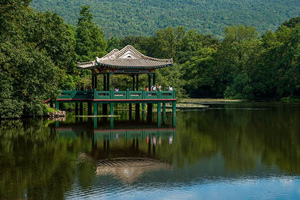
Liuhui Pavilion, also known as Water Pavilion, is one of the memorial buildings of Sun Yat-sen Mausoleum, which was built in the winter of 1932. It was donated by the Central Army Military Academy and designed by Gu Wenyu, a cemetery engineer.
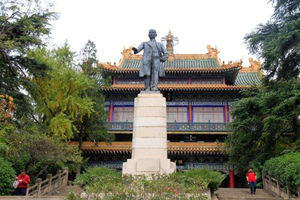
Sun Yat-sen Memorial Hall is located in the dense forest between Sun Yat-sen Mausoleum and Linggu Temple. It is a classical building imitating the Lama Temple of Qing Dynasty. The main building is 20.8 meters high, with green glazed tiles on the top and yellow glazed tiles on the roof. The center of the main ridge is decorated with colorful paintings. The building houses precious historical materials such as Dr. Sun Yat-sen's classic works and so on. There is a 2.6-meter-high bronze statue of Dr. Sun Yat-sen stands in the center of the square in front of the building. And visitors could find a 125-meter-long tablet gallery behind the building, engraved with the full text of "Three People's Principles" written by Dr. Sun Yat-sen.
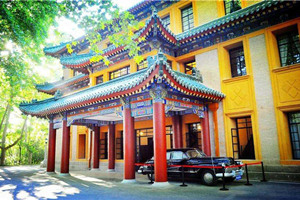
Meiling Palace, also known as "the Official Residence of the President of the National Government", is the villa where Chiang Kai-shek and his wife Song Meiling stayed. With the reputation of "the First Villa in the Far East", the main building of Meiling Palace is a three-story palace-style building with green glazed tiles. There are more than 1,000 phoenixes carved on the glazed tiles of its eaves, which is unique in China.
Walk along the marble road→Half-moon Square→the Memorial Gate( Paifang)→the Pavilion→the Sacrificial Hall→Sun Yat-sen Memoria→Liuhui Pavilion→Sun Yat-sen Mausoleum Music stage
Passengers can take the city bus No.9, No.34 (Bo 'ai Line), No.201, No.202 and No.203, and get off at the Sun Yat-sen Mausoleum station.
Passengers need to get off at Xiamafang Station by taking Nanjing Metro Line 2, and then transfer to bus No.34 (Bo 'ai Line) to Sun Yat-sen Mausoleum Parking Lot.
Chinese: 请带我去中山陵。English: Please take me to the Sun Yat-sen Mausoleum.
If you go to the Sun Yat-sen Mausoleum from Nanjing Lukou International Airport, it takes about 45 minutes(about 150 yuan).
If you go to the Sun Yat-sen Mausoleum from the Nanjing Railway Station, it takes about 16 minutes(about 28 yuan).
If you go to the Sun Yat-sen Mausoleum from the Nanjing South Railway Station, it takes about 20 minutes(about 41 yuan).
If you go to the Sun Yat-sen Mausoleum from the Nanjing East Railway Station, it takes about 25 minutes(about 45 yuan).
